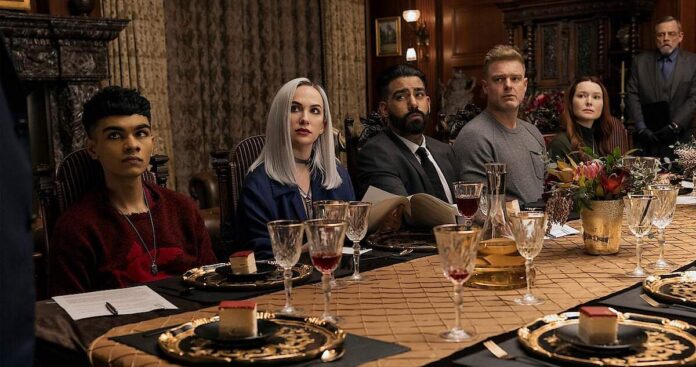There is something so calming and satisfying about how Mike Flanagan uses horror in his storytelling. Even without an overdose of jump scares and white-cloaked figures lurking in the hallways to lure you into doomed fates, he showcases an effectual way of evoking fear and horror that is cathartic. If he used the wrath of religion and its organised dominance on the human race in The Midnight Mass to instill terror, in his latest outing, The Fall of the House of Usher (TFHU), Flanagan deliciously feeds us the horror of the greed-driven pharmaceutical world, and densely carved threads exposing human shallowness.
Streamer: Netflix
Created by: Mike Flanagan
Cast: Carla Gugino, Bruce Greenwood, Mary McDonnell, Henry Thomas, Kate Siegel, Rahul Kohli
Flanagan’s approach to his works, which are mostly derived from literary creations, is solidly and delightfully layered, making it perfect for long-form storytelling. A distinct feature, which also works for smart and intriguing storytelling, is how Flanagan plays with multiple characters, (which are beautifully portrayed by his recurring cast members), enriched with so many details, making them shine in the various dimensions. If his previous outing at Netflix, The Midnight Club, taken from Christopher Pike’s work, doubled up as a horror anthology, TFHU traces the fate of the titular family. They have exploited the pharmaceutical industry with their addictive painkillers produced under the company of Fortunato. Fate strikes them hard, unleashing a generational curse on the Usher heirs, one child at a time. With back-to-back funerals, all that is left is the family’s sibling duo Roderick and Madeline Usher, who sit atop the highest rung, waiting until the mystery brewing comes to attack them. We are also often taken back to the primary days of Madeline and Roderick, who once were considered outcasts and illegitimate children of Fortunato’s chairperson, whose one chance meeting with the mysterious Verna, takes a plunging turn. Years later, when Roderick, after the funeral of his six children, calls attorney Auguste Dupin to confess, TFHU revels in the mystery.
At one point in TFHU, Verna, who appears at various unfortunate instances, encompasses the beauty of poetry by saying it is “a safe space for a difficult truth”. This very phrase is the concise summation of the show that consists of a terribly skewed and morally-starved set of individuals, who engage in a range of things from debauchery to unusual fetishes and exploitative behaviours. Using such defective lives, the show puts out a difficult truth; one where even the purest feeling of love has to compete harshly against strips of rich nylons and stashes of robbed treasures. Even as the show might leave out explaining who Verna is, the show builds on its moments, eventually tying the threads that once were loose.
In each of the eight episodes of TFHU, each of the sibling’s deaths is detailed. The characters are layered, and carefully crafted to imperfection. Sure, these siblings ought not to earn sympathy, given their ruthless nature of exploiting the power that dabbles in their hands. They conduct unethical tests, and are serious enemies to environmental well-being. But when the series juxtaposes the rise of power of Madeline and Roderick, to what they are now, it questions the basics of humanity and what pushes people to the extremes.
There is also a delectable touch that Flanagan uses to stress the importance of family that gets a well-rounded curve drawing parallels between Roderick Usher and Auguste Dupin, one of whom chooses materialistic prosperity over blood. TFHU also smartly uses horror to its advantage and makes wise choices when to scare us in the “typical” way. The supernaturalism is not merely used as a jump scare, but when Flanagan equips it with a slow-burn horror reflecting the lifestyle humans have become accustomed to, the real scare creeps in. The series might have some tepid stretches, if you do not have an appetite for such a scare, and can become tedious. For instance, you never know why Roderick chose to have his four other children with different mothers, after his wife Annabelle Lee parts ways with him. But aside from such minor detailing, as the final stretch kicks in, and Flanagan pulls off his last card that ties all loose ends together, you know the horror is not just on white faces and floating gowns.

#Fall #House #Usher #Series #Review #rewarding #slowburner

